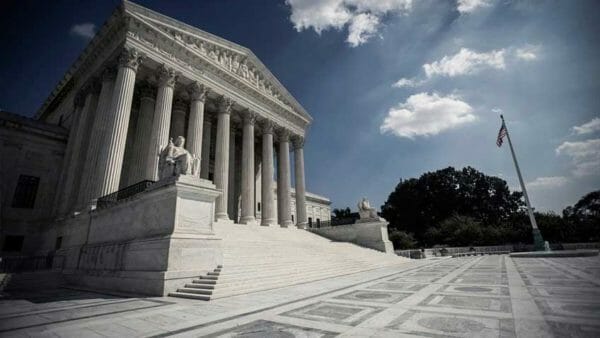
U.S.A. –-(AmmoLand.com)- Of the three branches of the Federal Government in our federal system, the U.S. Supreme Court is either our best hope for preserving the U.S. Constitution and strengthening the Bill of Rights, or it’s our worst fear realized, if the court endangers the Constitution and weakens the Bill of Rights, abandoning the American citizenry to an awful fate.
In his concurring opinion in the New York City gun transport case, Justice Kavanaugh asserts, inter alia, “I share Justice Alito’s concern that some federal and state courts may not be properly applying Heller and McDonald. The Court should address that issue soon, perhaps in one of the several Second Amendment cases with petitions for certiorari now pending before the Court.”
If Justice Kavanaugh’s concurring opinion is meant to give Americans a modicum of hope, he failed miserably. He has merely raised suspicion as to his true motivations and jurisprudential leanings apropos of the Bill of Rights generally, and of the Second Amendment, particularly.
The word, ‘should,’ that Kavanaugh uses, in his concurring, doesn’t mean ‘shall,’ nor does it even mean ‘may.’
Given the reluctance of the High Court hearing any Second Amendment case, even and especially those infringing the very core of it, the prospect of the Court actually taking up another Second Amendment case in the near future is more improbable than likely. Why is that?
The U.S. Supreme Court Reviews Very Few Cases
First, the Court has limited time, given the number of cases that come before it during any term. As set forth in the SCOTUS Blog:
“In most circumstances, the Supreme Court has discretion whether or not to grant review of a particular case. Of the 7,000 to 8,000 cert petitions filed each term, the court grants certiorari and hears oral argument in only about 80. Granting a cert petition requires the votes of four justices.”
Since the High Court reviews only a fraction of the cases brought to it in any given term, and since the High Court is averse to hearing Second Amendment cases, it will only be on a wing and a prayer that the Supreme Court is likely to take up any Second Amendment case, given the Court’s present composition. And, if it does so at all, it will likely deny cert on any further Second Amendment case this Term because the Supreme Court Term is effectively over in late June, hardly more than one month from now as of the posting of this article.
Note, “A Term of the Supreme Court begins, by statute, on the first Monday in October. . . . The Term is divided between ‘sittings,’ when the Justices hear cases and deliver opinions, and intervening ‘recesses,’ when they consider the business before the Court and write opinions. Sittings and recesses alternate at approximately two-week intervals.”
Moreover, “The Court is, typically, in recess from late June/early July until the first Monday in October. . . . The Court hears oral arguments in cases from October through April [and] All opinions of the Court are, typically, handed down by the last day of the Court’s term (the day in late June/early July when the Court recesses for the summer). With the exception of this deadline, there are no rules concerning when decisions must be released. Typically, decisions that are unanimous are released sooner than those that have concurring and dissenting opinions. While some unanimous decisions are handed down as early as December, some controversial opinions, even if heard in October, may not be handed down until the last day of the term.”
Suppose The High Court Does Secure Four Votes Necessary To Review A Second Amendment Case, What Then?
Second, even if, by some strange happenstance the Supreme Court does grant review in one of the pending Second Amendment cases, in the next few weeks, especially given the impact of the Communist Chinese Coronavirus, one may justifiably ask when will that case be briefed; when will it be argued in oral hearing before the Court; and when might the case be decided? And, most significantly: how will that case be decided?
Given that Chief Justice Roberts and Associate Justice Kavanaugh both sided with the liberal wing of the High Court on the New York City gun transport case, that fact alone is a matter for deep concern.
In any event, all of this—from voting to hear a case, to the releasing of a decision in that case—takes an inordinate amount of time and, with a General U.S. Presidential election coming up in November 2020, an election just around the corner, both the liberal wing and conservative wing of the High Court may have their own good reasons for not taking up another Second Amendment case this Term.
Consider the ramifications of the results of the 2020 U.S. Presidential election, both on the eventual composition of the Supreme Court and on the manner in which a Second Amendment case would be decided.
Supreme Court Justices, no less than average citizens, do surely manifest deep concern over the outcome of the upcoming U.S. Presidential election. And whom it is that wins the election will be able to actuate one or the other of two alternate, incompatible, radically distinct visions for the Nation.
One vision is grounded on the political and social philosophy of Individualism, championed by the Founders of our Free Republic, and actualized in the Constitution that the States, in existence at the time, had ratified. That Constitution is the blueprint of the structure of our Nation, where the people themselves are sovereign: a notion manifest in no other nation in the world despite talk, for example, by the rulers of the EU, holed up in Brussels, who govern the nations comprising the EU. These “elites” talk endlessly, and disingenuously, and deceptively of the EU’s liberal democratic values. But that is nothing more than flimflam and flummery.
The second vision is grounded on the political and social philosophy of Collectivism—a term that is wending its way more frequently into political discourse, as the Radical Left talks carefully, non-critically, and often glowingly, about the benefits of life in both the EU and in the Autocratic, Communist Collectivist regime of Xi Jinping of China. See Arbalest Quarrel Article, titled, “The Modern Civil War: A Clash of Ideologies, posted October 6, 2018.” Note: In that article, we point to Judge Brett Kavanaugh’s confirmation as an Associate Justice of the U.S. Supreme Court, which, at the time of the posting of the article, had just occurred.
Would that we knew then what we know now, having seen Justice Kavanaugh’s insipid, seemingly groveling, duplicitous Concurring Opinion in the New York City Gun Transport case. We said, at the time:
“With Brett Kavanaugh now on the high Court, the Individualists’ vision for this Country is now more likely to prevail in the decades ahead than is the vision of the Collectivists. Had Hillary Clinton prevailed in the 2016 U.S. Presidential election, and thereupon nominated individuals to the high Court who view the Constitution of the United States as a “Living Document,” susceptible to massive judicial and legislative revision, the direction of this Country would have continued along the path created for it by the Bush and Clinton clans, and by Barack Obama. Americans would have seen the eventual loss of this Country’s independence and sovereignty, and, concomitantly, Americans would have seen the loss of the fundamental, unalienable rights guaranteed to them, as codified in the Nation’s Bill of Rights. The losses would have been drastic, and those losses would have been assured. Thankfully, a dire future for this Nation and its people is less likely to happen now, as the election of Trump has enabled the Nation to pivot back to the path laid out for us by the founders of the Nation. But there is still much work ahead for the American people. We must remain ever vigilant.”
The Most Important U.S. Presidential Election Of The Last Two Centuries Is Upon Us
The principles of Collectivism were anathema to the founders of our Nation; and those principles are wholly incompatible with the Constitution the framers designed, predicated on the tenets of Individualism, the foundation of our Nation. The two political and social philosophies, Individualism and Collectivism, cannot be reconciled. And those who wish to implement the principles of Collectivism in our Nation know this. That is why they talk openly of major amendments to the Constitution.
Indeed, some Collectivists talk of doing away with the U.S. Constitution altogether, as it would be far easier to draft a new Constitution grounded on the principles of Collectivism than to try to reconfigure the original Constitution, grounded as it is on a completely different set of precepts: those of Individualism. And we will be headed in a very disturbing direction if the Collectivists do succeed in taking firm control over the reins of Government.

About The Arbalest Quarrel:
Arbalest Group created `The Arbalest Quarrel’ website for a special purpose. That purpose is to educate the American public about recent Federal and State firearms control legislation. No other website, to our knowledge, provides as deep an analysis or as thorough an analysis. Arbalest Group offers this information free.
For more information, visit: www.arbalestquarrel.com.
